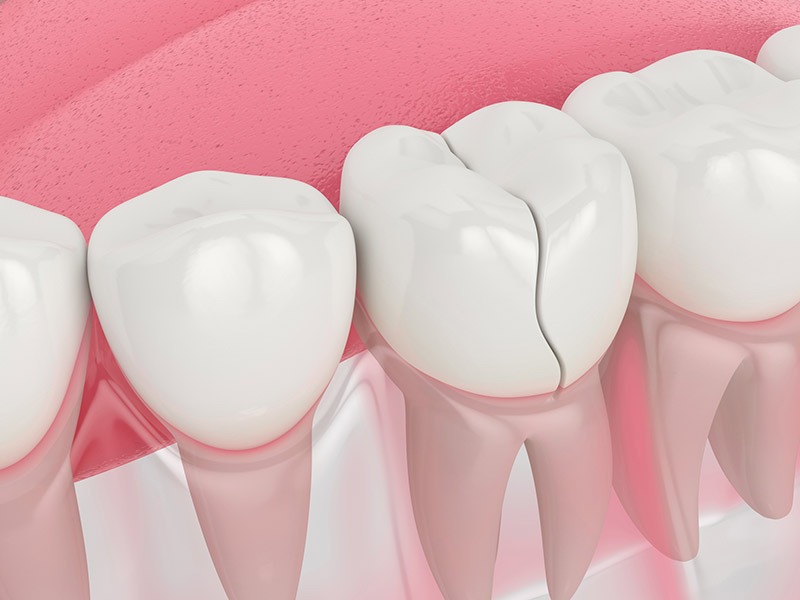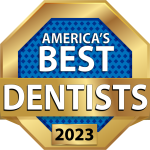
Dental emergencies are quite frightening and often painful. We’re here to help you address the problem and find an immediate solution. On this page you will find information about common dental emergencies. We’ve also included information on how you can immediately address the issue before coming to our office for further care.
If you are in severe pain, it is essential to contact our office
immediately. The pain caused by dental emergencies almost always gets worse without treatment, and dental issues can
seriously jeopardize physical health. Our office is here to help you.


If your tooth has been knocked clean out of your mouth, it is essential to see a dentist immediately. When a tooth exits the mouth, tissues, nerves, and blood vessels become damaged. In these situations, timing is key: if the tooth can be placed back into its socket within an hour, there is a chance the tissues will grow to support the tooth once again.
Here are some steps to take if your tooth has been knocked out:
When you arrive at our office, we will try to place the tooth back into its natural socket. In some cases the tooth will reattach. If the tooth is in good condition and the bone around the tooth was not damaged, the tooth could reattach over a period of several weeks. If the inner mechanisms of the tooth are seriously damaged, root canal therapy might be necessary. We will assess your situation in our office and propose the best treatment for your specific needs. Regardless of the treatment option that ends up being best for you, we will see you back in our office for regular check ups to make sure that the site of the injury is healing well.

Crowns generally become loose because the tooth beneath them is decaying. The decay causes the tooth to change shape, and this means that the crown no longer fits.
Usually, a crown or filling comes loose while eating. If you think that you accidentally swallowed your crown, it’s a good idea to check with your medical doctor. You may have aspirated, or inhaled, the crown. If this is the case, it could cause damage to your lungs. If you did indeed swallow the crown, it should pass in a day or two with no complications.
Once your crown is out of your mouth, the affected tooth may be incredibly sensitive to temperature changes and pressure. It’s best not to eat until you have had your crown replaced, or at least until you have covered your sensitive tooth with a temporary layer of dental cement.
If a crown has dropped out of the mouth, call our office and make a dental appointment as soon as possible. Keep the crown in a cool, safe, and clean place. There is a possibility that we can reinsert the crown, but if the crown is out of the mouth for a long period of time the teeth may shift or sustain further damage.
If you are not able to immediately come into our office, here are the steps to take:
When you arrive at our office, we will check the crown to see if it still fits. If it does, we will reattach it to your tooth. If decay is noted on the tooth, we will treat the decay and have a new crown made. This new crown will fit your new tooth shape.

The teeth are strong, but they are still prone to fractures, cracks, and breaks. Sometimes fractures are fairly painless, but if the crack extends down into the root, the pain could be extreme. Fractures, cracks, and breaks can take several different forms. They are generally caused by trauma, grinding, and biting. If a tooth has been fractured or cracked, please schedule an appointment with us as quickly as possible.
Before you come into the office, there are a few steps that you can take at home. If a segment of tooth has been broken off, here’s what you should do:
The nature of the break or fracture will determine what we are able to do. If a fracture or crack extends into the root, root canal therapy is often the most effective way to retain the tooth. In the case of a complete break, we will usually affix the fragment back onto the tooth as a temporary measure.


When a tooth has been dislodged or loosened from its socket by trauma or decay, it might be possible to save it. If the tooth remains in the mouth and is still attached to blood vessels and nerves, there is a good chance that root canal therapy will not be necessary.
Please call our office immediately to make an appointment. In the meantime, use a cold compress and over-the-counter medications to relieve pain. Your dentist will reposition the tooth and add splints to stabilize it. If the tooth fails to heal, root canal therapy might be required.
Casey Klein, DDS
Bianca Badaro, DMD

CK Family Dental © 2024 All Rights Reserved